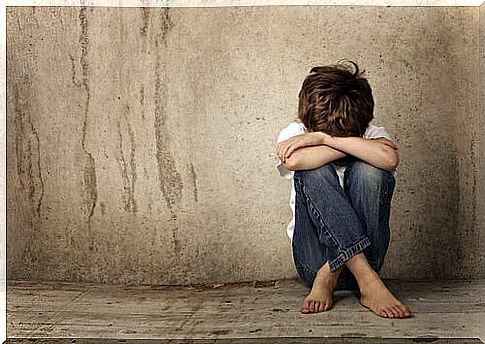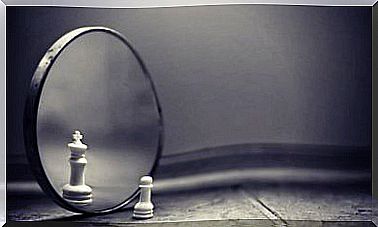Contempt Generates Psychological Damage

Contempt is in the form of a word that hurts and demoralizes. It is also a gesture, the grimace of a lip or an eyebrow that reflects rejection of what you say or do at a given moment. Few behaviors are as damaging to psychological integrity as those that, little by little, end up breaking a relationship or forever mark the development of a child.
Although we are more used to talking and reading about aspects related to hatred or indifference, it should be noted that contempt is undoubtedly the most lethal emotion. It is that weapon of mass destruction that requires a little more sophistication. Thus, while anger or indifference can be specific and momentary reactions, contempt starts from a darker underground.
Whoever despises has the clear intention of humiliating the other. It seeks to ridicule, belittle, and even nullify the other person in an open and overt way. He does it looking for the perfect opportunity and he achieves it by practicing it daily until he leaves a wound in the mind, a fracture in self-esteem and forever breaking the bond of trust.
Fathers, mothers, couples, co-workers … Contempt is often the order of the day in an open way or in a discreet and sibylline way. Be that as it may, there is something that we must be clear about: the despiser shows a clearly cowardly behavior that thrives on resentment and the absolute lack of emotional maturity.

The everyday contempt that breaks relationships
All of us, in some way, have in mind the memory of that situation in which we feel the wound of contempt. Perhaps it was in childhood, when someone did not understand our effort when making that drawing, that detail that at one point was criticized and even ridiculed. Perhaps one of our parents even had that peculiar ability, that of belittling every thing done, said, or desired.
Even more, it is possible that we have gone through an affective relationship where our partner had this habit. The one to make a face with the mouth when we commented something. That of criticizing our tastes, that of belittling opinions, that of objectifying every little thing that we did or did not do. It is no coincidence, for example, that John Gottmann, a psychologist and renowned expert in relationships, stated after almost four decades of research that contempt is undoubtedly one of the factors that predicts most breakups.
Let us, however, see in greater depth what dimensions usually define the act of contempt.
The Anatomy of Contempt
- Contempt is the opposite side of empathy.
- While empathy is the ability to open up to the other and connect with their reality and needs, contempt does the opposite. First he builds a wall and then he rises over it in an attitude of power to denigrate and belittle the other.
- Likewise, children who grow up in environments characterized by contempt and humiliation are more likely to develop low self-esteem, feelings of guilt, shame, and stress and anxiety disorders.
- On the other hand, people who are used to looking down on others often have certain points in common. They are profiles that do not tolerate disagreement and do not connect or see the needs of others. In addition, it is characteristic that they are not very skilled at communicating, hence they resort to facial grimaces, to emit sighs, to show us with their posture and their eyes their deep contempt.
- Behind these profiles there are usually certain psychological dimensions. They are people full of frustration and even buried anger. The exercise of contempt helps them to project and pour onto others their own negative emotions, their personal dissatisfaction.

Contempt and psychological damage
Continued contempt generates not only psychological damage, it also impacts one’s own health. The University of Pennsylvania conducted a study in a series of schools where several facts were discovered. The first was undoubtedly the effect that this dimension has on self-esteem: all those students who had been victims of humiliation and contempt had a more weakened and negative view of themselves.
Likewise, contempt and those situations of stress and continued violation have a serious effect on our defenses. It is common for us to suffer more colds, more allergies, more digestive problems, infections, etc. All this undoubtedly makes us almost obliged to take care of this defect in ourselves, this inclination that at some point we can let fall in others by despising words or ridiculing other people’s actions.
Let us understand that contempt is the most harmful dimension that we can receive and offer to others. It is a way of invalidating, it is an absolute lack of compassion and empathy, it is generating pain in others and engendering the seed of anguish and fear. The same that ends up breaking our affective relationships, the same that makes our children grow up with fear and a fragmented and weak self-concept.
Let us reflect on this, remembering what Honoré de Balzac said at the time about this same topic: ” Incurable wounds are those inflicted by the tongue, the eyes, mockery and contempt”.
How to act in the face of contempt?
If at any time you are a victim of contempt by another person, here are some tips to deal with the situation:
- Set limits. Let that person know that you are not willing to put up with such acts and behaviors.
- Stay away from those kinds of people. Whoever despises you does not love you. So do not waste your time, or be next to someone who wants to harm you.
- Lean on the people who love you. Seek the support of those people who love you just the way you are, and who will always be by your side.
- Don’t let your self-esteem suffer. Reflect. Whoever despises you only does it to hurt you. Don’t listen to their opinions. Focus on all the good in you.
- Seek professional help. If you have been a victim of this kind of manipulation for a long time, it is recommended that you have psychological help. You do not have to bear a burden that is not yours. Do not do it.
- Beware. Look out for you and your health. Do everything that makes you feel good, and share it with the right people, that is, with those who love and love you.









